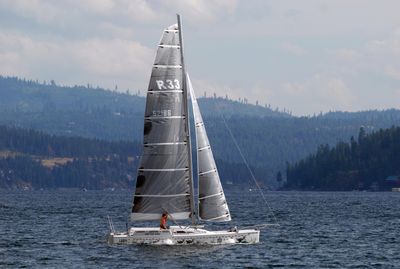Not for climatic faint of heart
Deep snow, 57 straight dry days, record heat

It may not rival ice storm, but 2008 could go down in Inland Northwest lore as the year of weather extremes.
Snow in June and triple-digit highs last weekend already mark this year as a record-breaker, and meteorologists say the weather is likely to keep you scrambling between swimsuit and sweat shirt.
“We’re dealing with a very extreme weather cycle,” meteorologist Randy Mann said. “You get cold, heat, drought, flooding rains – it’s all over the board, and I just don’t see an end to that anytime soon.”
The stormy cooler weather this week is the first reprieve in an unusually dry August. The 103-degree high Sunday in Spokane was not only a record for the date but the first time the city has seen a temperature that high so late in the season. The previous record was 103 degrees on Aug. 10, 1898.
Monday’s storms also broke a 57-day streak with no measurable rainfall, the sixth-longest dry spell in Spokane history.
But don’t forget that the dry summer followed an unusually snowy winter and wet spring that included snowfall on June 10, the latest ever recorded. Spokane had 92.6 inches of snow, according to the National Weather Service, just shy of the 1949 record of 93.5 inches, and many parts of North Idaho saw record depths.
“It’s all a very strange year,” said weather service meteorologist Jonathan Fox.
The Inland Northwest isn’t unique in these weather extremes, Mann said. He pointed to the rare snowfall last winter in Iraq and Hawaii, and the nearly 2,000 weather records broken across the United States last week.
“You’re seeing just crazy weather all over the place,” said the KREM 2 meteorologist.
Last year’s snowfall was unusually heavy, but not unexpected. The region was affected by La Niña conditions, meaning surface temperatures in the Pacific Ocean were cooler and led to more inland storms. But that “has nothing to do with why we’ve been so dry though this summer,” Fox said.
Mann expects weak El Niño conditions will come into play for a different kind of winter. “I believe we’re going to see a colder winter, but not nearly as much snow.”
But if a chilly winter – and the corresponding energy bill – isn’t an appealing thought, take solace in forecasts for the coming weekend. The weather service predicts the sun to return for at least a few low-80s days that would be gloriously average.